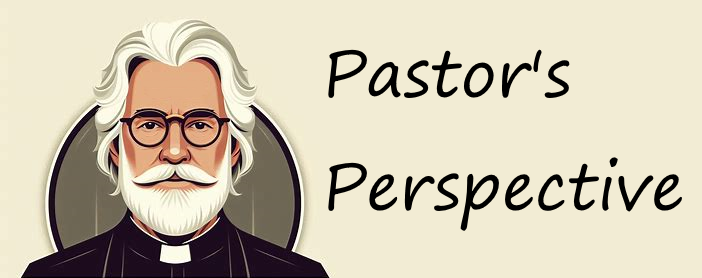Pastor Patrick’s Perspective: September 2025
— You’ve probably heard the question before, “When did you accept Jesus as your Savior?” It often comes from well-meaning Christians. But for us Lutherans, that question feels strange. We don’t talk about our salvation as something we decided. We confess it as something God has given. That difference—between decision and gift—gets at the heart of what’s often called “decision theology.”
Decision theology can be summarized simply: God has done His part; now you must do yours. He died, now you decide. The gospel is presented as an offer, but the offer is not complete until you “accept” it or “decide” to follow Jesus. In practice, this often takes the form of a mourner’s bench, an altar call, a “sinner’s prayer,” or a moment when you are urged to choose Christ. “Have you asked Him into your heart?”
This way of thinking stands in sharp contrast to the Reformation. Martin Luther and the reformers fought against works-righteousness in the medieval church, where people were told they must add their own works to complete God’s grace. Our entire heritage from the Reformation stands on the truth that salvation is by grace alone, through faith alone, for the sake of Christ alone. “I believe that I cannot by my own reason or strength believe in Jesus Christ, my Lord, or come to Him.” Decision theology is simply a modern version of the same error. Instead of trusting in indulgences or pilgrimages, the “work” becomes the human decision. Either way, it turns us back to ourselves instead of to Christ.
The difference is in who does the action; do we or does God? God saves. Scripture helps us see at least two major concerns. First, deciding puts the weight of salvation on me. God may have acted in Christ, but now I must “finish” the work by choosing Him. In this way, God’s grace is no longer free and complete; it is conditional on my decision. This not only diminishes grace, but it also neglects the true work of the Holy Spirit, who alone calls, gathers, enlightens, and sanctifies the whole Christian church.
Second when salvation rests on my choice, I am left to wonder: Was my prayer sincere enough? Did I truly mean it? Was my decision genuine? Have I done enough? This language encourages a turn inward, toward self-examination. Instead of the firm comfort of God’s promise in Christ, I am left with the shaky ground of my own feelings and sincerity. Faith becomes a momentary act rather than a continual trust in God’s promise. Scripture, however, teaches that faith is not a one-time decision but a life sustained daily by God’s gifts.
Here it is important to be clear; many Christians who speak the language of decision theology truly trust in Christ. God’s Word is powerful, and the Holy Spirit works faith even when human teaching is flawed. If someone “came to Christ” through a decision, that does not mean they are not a Christian. Rather, it means the Holy Spirit was already at work through the Word, creating faith in their hearts.
The danger is not that they are necessarily unbelievers, but that they are burdened with the temptation to look inward instead of outward to the promises of God. These burden’s leave the door open for the devil’s temptations to leave the faith because they are not good enough. That is why this issue matters. We want Christians to have the comfort of knowing that their salvation rests not on their sincerity, their memory of a decision, or their inner strength, but on Christ’s sure promise and His finished work.
So where do we turn? Not inward, but outward—to the clear voice of Scripture. Over and over, God’s Word reminds us that salvation is His work from beginning to end. “You did not choose me, but I chose you” (John 15:16). “It is by grace you have been saved, through faith—and this is not from yourselves, it is the gift of God—not by works, so that no one can boast” (Ephesians 2:8–9). “Faith comes from hearing the message, and the message is heard through the word about Christ” (Romans 10:17).
We rest not in our decision but in Christ’s promise. Our confidence is not in what we once did but in what Christ has done for us and continues to do for us through His Spirit. Because salvation is God’s work from start to finish, you can be certain it is complete, sure, and trustworthy. And that is good news. For the God who began the good work in you is faithful, and He will carry it on to completion in the day of Christ Jesus (Philippians 1:6).
Gracious Lord, You chose us before the foundation of the world and called us through Your Word and Spirit. Guard us from the temptation to trust in ourselves. Fix our hearts on Your Son, who has done all things for our salvation. Give us confidence that our lives rest securely in Your hands. Keep us steadfast in Your grace, and grant that we may live each day in the joy of Your forgiveness, serving our neighbors in love. Through Jesus Christ, our Lord. Amen.
© Patrick K Welton
